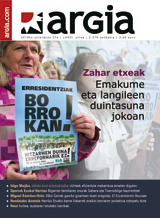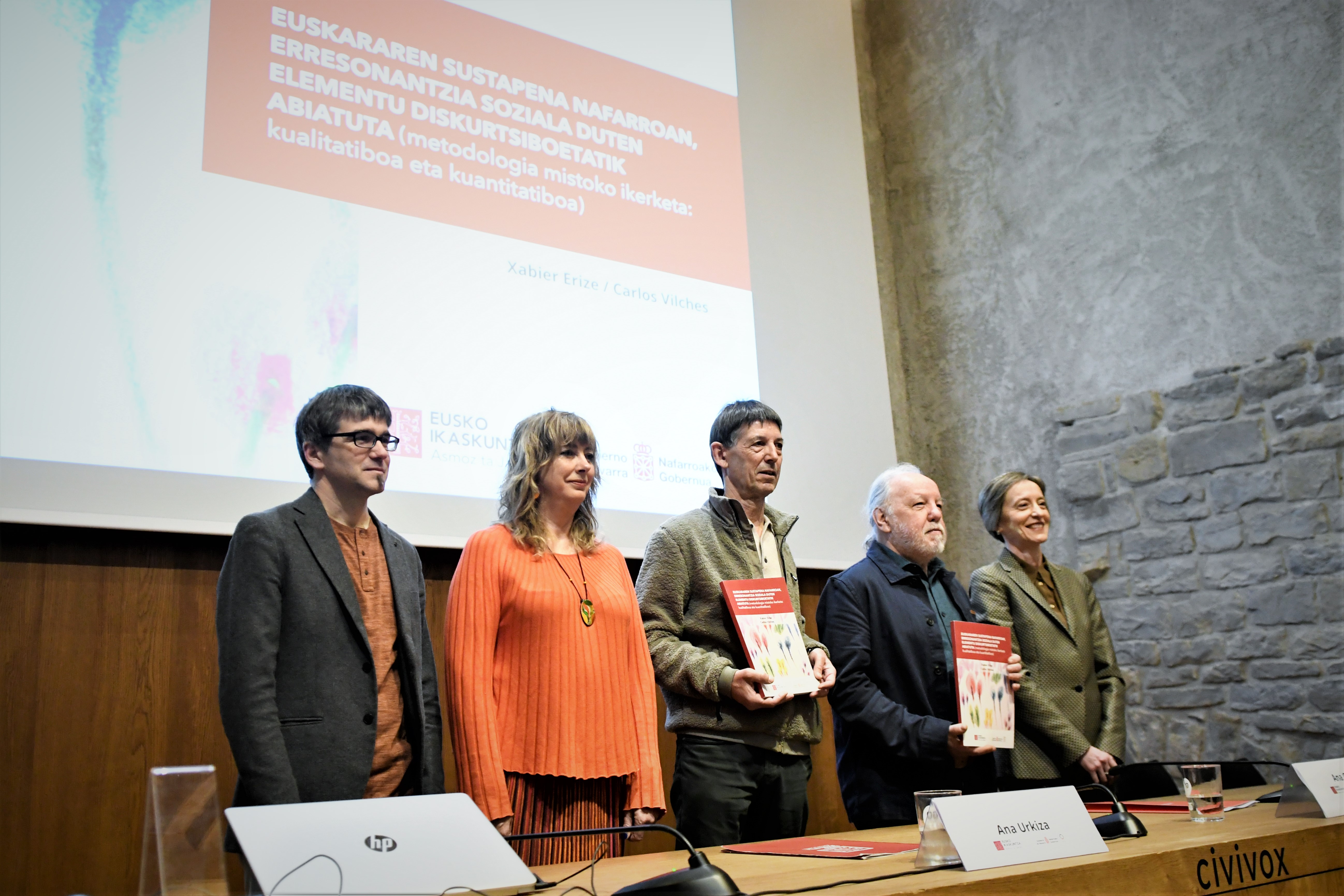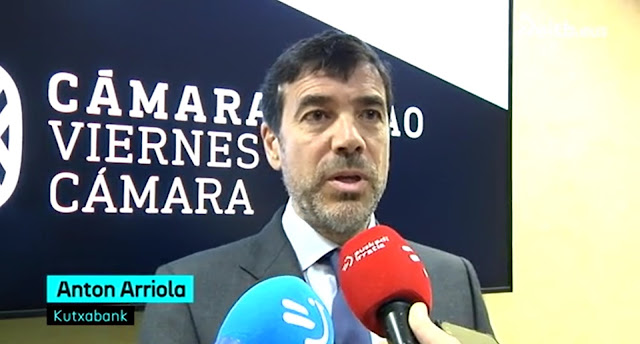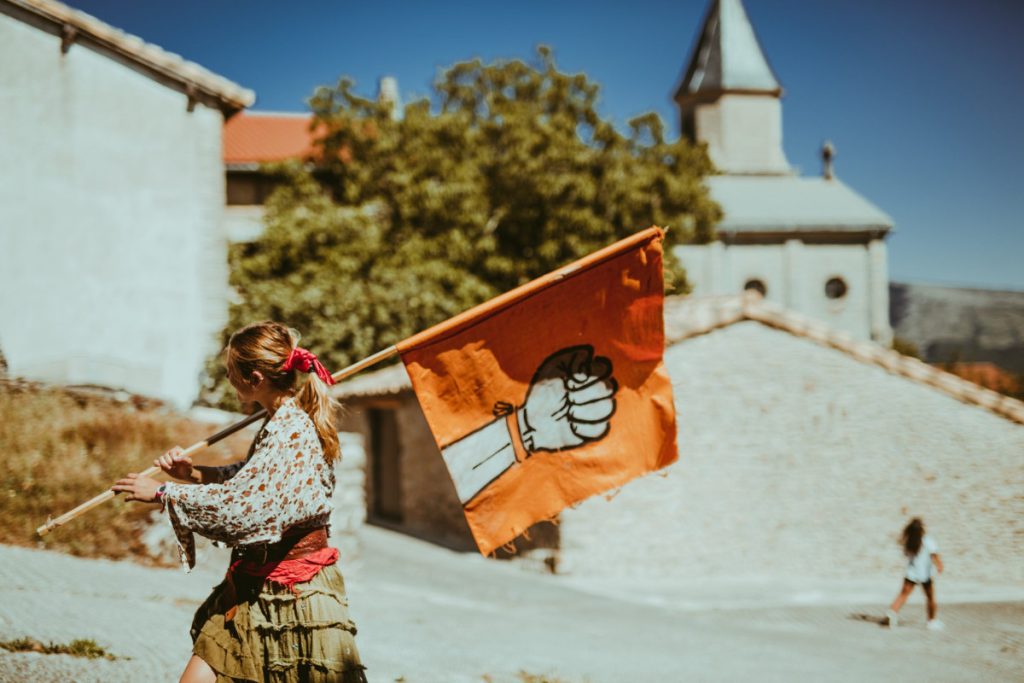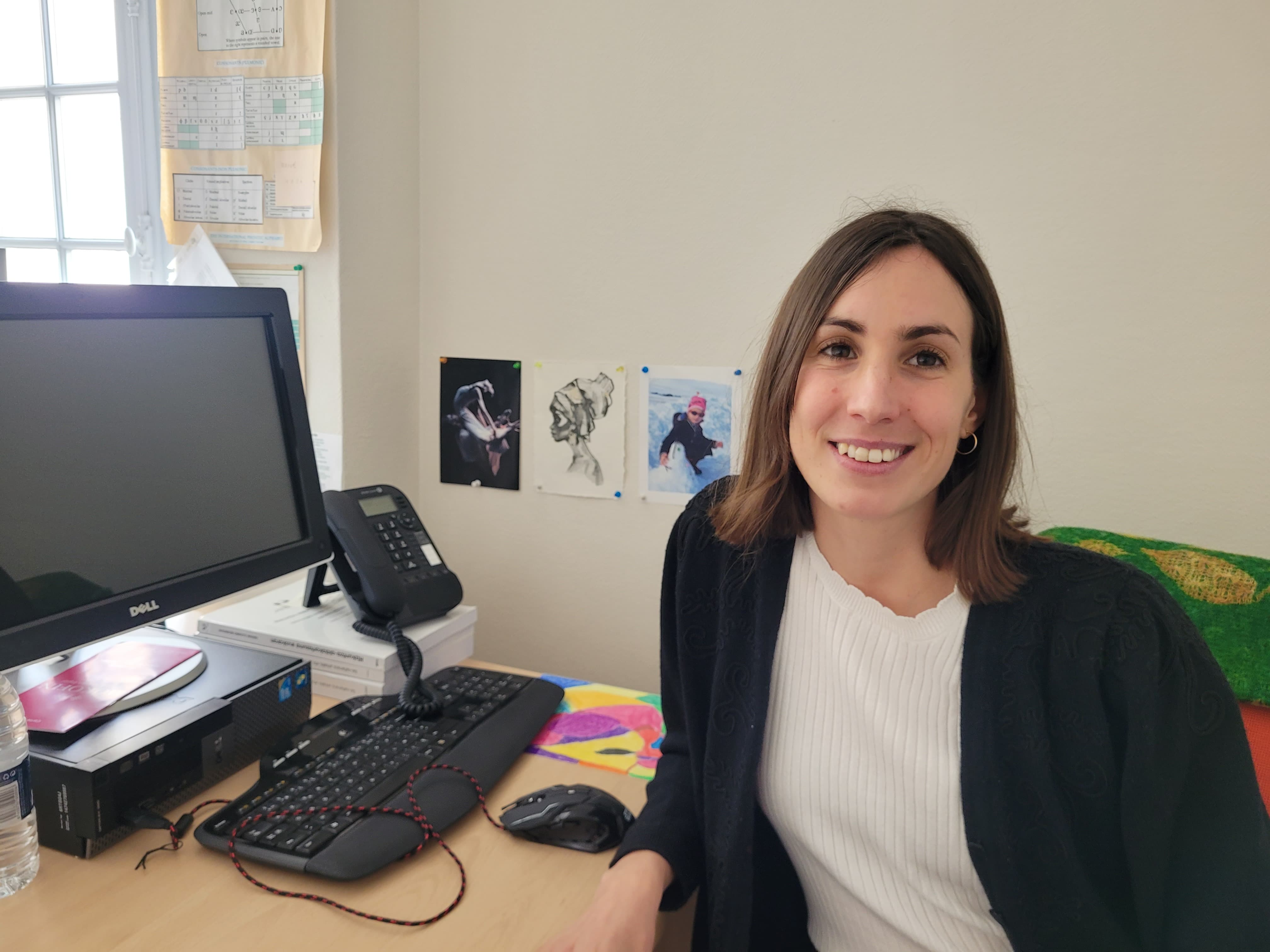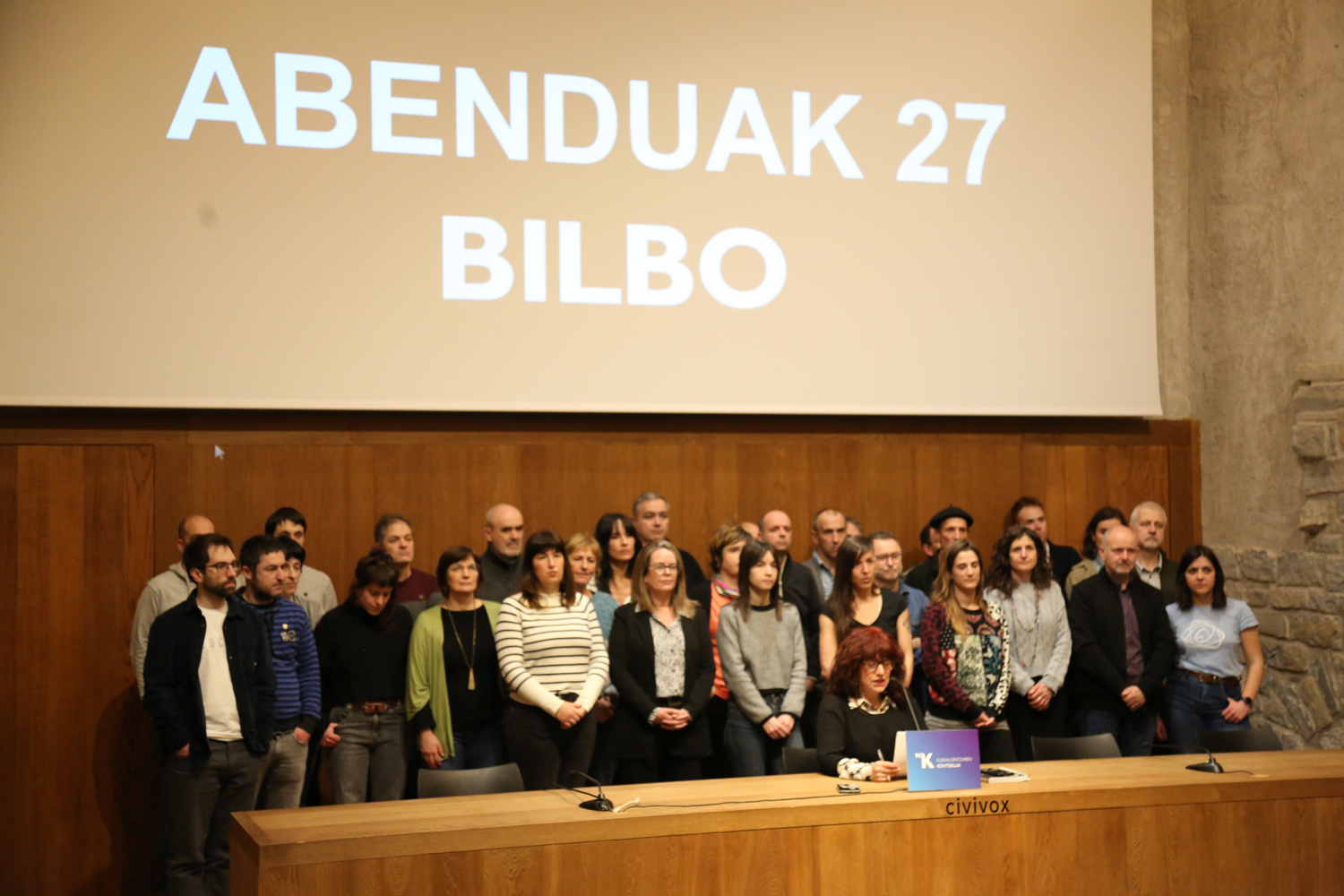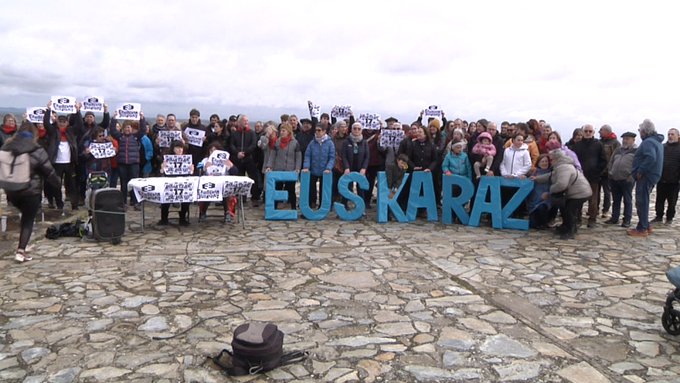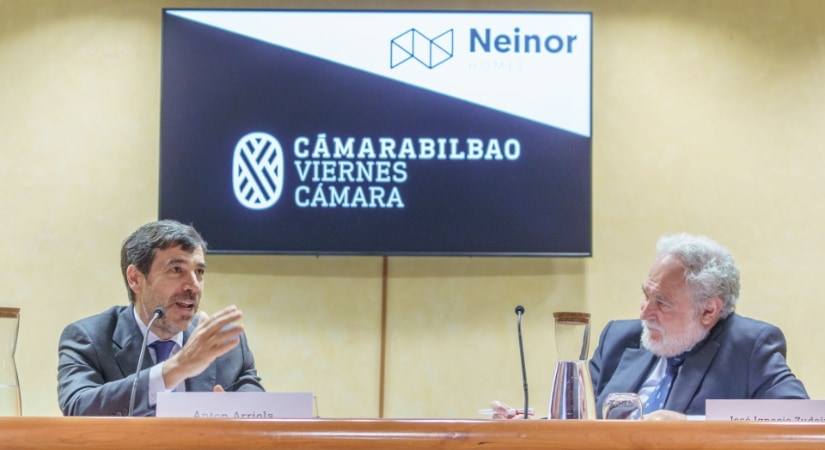When Euskera put his nose in education
- Education, in addition to offering day-to-day skills, can perform other functions, such as being a tool for recovering an endangered language. This is confirmed by the new brochure published by Garabide Elkartea in the Euskararen Errekaketa collection.
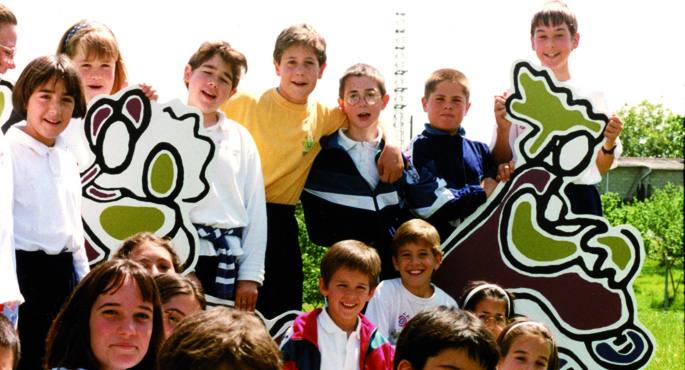
The Garabide Association, which works for the revitalization of languages, began four or five years ago to publish the Euskararen Iraultza collection. The aim is to gather the work that has been done in the last 50 years to boost Euskera, as it can help other communities with minority languages. In the words of the coordinator of the collection, Alberto Barandiaran, “we want to make our experience known, it is not about saying how things should be done in other places”.
Previous studies have analyzed the keys to the recovery of Euskera, the standardization of Euskera and the media. In this room, the Basque Country Recovery IV: In the book and in the DVD of education, elaborated by Argia, the theme is teaching, together with the administration and the media, which consider it to be one of the three pillars for the revitalization of the language.
Schools have often been used as tools for language rejection. In Europe or in western civilizations, the education of minorities has been considered an obstacle to the unity of states, states have taught the main language in the centres and have promoted bilingual or minority communities to monolingualism.
Among us, the ikastolas as axis
In Euskal Herria, education has been the starting point for many things. The creation of the ikastolas began in the 1960s and then reflected on the need to stop the loss of the Basque Country and start working on its recovery. According to Barandiaran, “education is closely related to transmission, language consolidation, standardization, prestige, and culturalization. Consequently, the incorporation of Euskera into teaching was considered essential”.
Created underground, ikastolas were constituted as a means to ensure transmission. The students met in empty places, with teachers without material or training. The parents intended to promote an education that had nothing to do with the rigid teaching imposed by the Franco dictatorship or with religious orders. As a result, ikastolas attracted people of different sensibilities. They were based on the auzolan and, by joining groups of parents of children who wanted to learn Basque in the same town or neighborhood, they rented the place. Then they were looking for a teacher. They paid the expenses with their monthly fee or that obtained at organized events. Parents had a lot to do with education, for example, when choosing material and profesorado.Las ikastolas spread through the cities and the children of many Castilian and Spanish families who were in
favor of the Basque Country began to attend. This led to a two-speed teaching, as children who spoke in Spanish at home could not learn Basque like Euskaldunes.
The development of the ikastolas forced public institutions to take steps forward. The Law of the Parliament of 1983 recognized the need to guarantee the right of CAPV children to study in Basque and Spanish, and established linguistic models: A, B and D.
In Navarra, the Law of the Vascuence of 1986 gave a boost to the implementation of Basque education in public schools, but the territory is divided into three areas and still each has its educational policy. In Iparralde, the ikastolas are practically the only option to learn Basque.
Barandiaran has acknowledged that in education the administration has taken a step further: “Here the popular initiative has started and taken its first steps and without that movement, that is, without the consciousness and the popular thrust, it is hardly possible to recover the language. Government support is essential for this to succeed, but only with its impetus would it not succeed. Therefore, the sum of both is needed.”
The immersion system, tool for euskaldunizar
In recent years, the immersion system has prevailed both in the ikastolas of Euskal Herria and in the public centers. With this model, boys and girls, instead of schooling in the domestic language, register in the second language and have the domestic language as a subject. “In Euskal Herria, Euskera dominates in very few areas and many children who come to school have Spanish as their first language. In our case, it has been demonstrated that the immersion model is the only one that euskalduniza. The immersion system conjures the language, does not consider it a secondary language, and as a result, students acquire sufficient competence to use the language and not only at school,” Barandiaran explained.
However, there are young people who, once compulsory education has been completed, do not have enough capacity to speak in Basque. “This is one of our problems. This shows that the school helps to assimilate Euskera, but that only he can’t do everything,” says the book’s author. In the opinion of many agents, we are at a moment of change, in which it is guaranteed that most students can learn Basque, it is time to look at use and create opportunities to live in euskera.El immersion system, besides allowing learning two languages, facilitates the learning of the
third party. Today, English is a compulsory subject throughout the public network and the number of hours varies according to models and centers. The ikastolas, for their part, develop the Eleanitz project. With Euskera as a priority, boys and girls start learning English at the age of 4, the age at which they are easier to assimilate languages.
Curriculum: What to show?
In order to regain language and identity, it is not enough to have Basque education, which is taught and the point of view is also important. The curriculum consists of deciding what competencies, knowledge, values and attitudes young people should attain at the age of 16. One of the first steps is usually to decide that when creating a school, but in our case the process was reverse, as the priority was to tackle the loss of the euskera.Han past years since the agents of the
ikastola began to work by the Basque Courtrolum, and Barandiaran defines it as one of the pillars of Basque education: “A school must be created to transmit the curriculum for the Basque Country, the Basque Country and the Basque Country.” However, the Basque Country has curricula according to its administrative distribution: In Navarre and the CAV, 55% of the curriculum is decided by the Spanish Government and 45% is determined by the administration of each community, while in Iparralde it is determined by the French State.
Progress has recently been made in this area, as the Eki project has been developed. For the development of the Basque Curriculum they have developed a didactic material for the course 2013-2014, adapted for the time being for the 1st of the ESO. It is expected that work will continue and that material for the other categories will be published in the coming years.
Gozamen aparta bezain deskribatzeko zaila dakar, norbaiten hitzak irakurri edo entzun ostean, zera pentsatzeak: “Horixe zen neu aurreko hartan azaltzen saiatu nintzena!”. Idazlea eta itzultzailea da María Reimóndez, eta galegoz aritzen da, hizkuntza... [+]
From linguistics or glotophobia and, of course, hatred against Basque, we have often seen our Basque become the dandruff of all sticks. Last of all, the president of Kutxabank, Anton Arriola, has been shaking our language and giving us galantas.The President of Kutxabank,
... [+]
Don't make a fuss, don't confront, don't victimize... and obey. As oppressed subjects, in this case as Basques, we talk, how many times have we had to listen to them? Ironically, two years ago, at the Euskalale Independentiston Meeting, Esne Arzallus said: "We have arrived here,... [+]
Euskal hizkuntzalaritza esperimentaleko katedra berria estreinatu dute Baionako fakultatean.
Bilbon eginiko aurkezpenean iragarri dute ekitaldia, euskarari "arnas berri bat emateko eta behar duen indarraldia gorpuzten hasteko" lehen urratsa izango dela nabarmenduta. Euskaltzale guztiei, baina, oro har, "justizia sozialean eta gizarte kohesioan aurre... [+]
Euskal Herrian Euskarazek manifestazioa deitu du apirilaren 6rako, 11n EHEko bi kide epaituko dituztelako. Hiriburuetatik autobusak antolatzen ari dira. Bi helburu bete nahi dituzte, batetik, epaituak izango diren bi kideei babesa erakustea, eta bestetik, euskararentzat justizia... [+]
Anton Txekhov, Raymond Carver eta Alice Munroren ipuingintzari buruzko mahai-ingurua egin dute Iker Sancho, Harkaitz Cano eta Isabel Etxeberria idazle eta itzultzaileek, Ignacio Aldecoa zenaren ipuin literarioaren jaialdian, Gasteizen. Beñat Sarasolak gidatuta, autore... [+]
Euskaraldiaren hamaikakoa aurkeztu dute Nafarroan: Julio Soto bertsolaria, Edurne Pena aktorea, Julen Goldarazena musikaria (Flakofonki), Claudia Rodriguez Goxuan Saltsan taldeko abeslaria, Eneko Garcia (Albina Stardust), Yasmine Khris Maansri itzultzaile eta kazetaria,... [+]
Azken hamarkadetan euskararen biziberritzeak duen erronka handienetakoa, euskararen ezagutzaren unibertsalizazioarekin batera, erabilerarena da. Askotan, gazteen euskararen erabileran jarri ohi dugu fokua, baita euskararen erabilerak izan duen eta izan dezakeen bilakaeraren... [+]
Prentsaurrekoan, maiatzaren 17an ospatuko duten Erriberako Euskararen Egunaren inguruko argibideak eman dituzte. Ume, gazte zein helduentzat zuzendua izango da. Ekimena, Erriberan egiten diren ekimenetan indarrak biltzeko eta euskararen normalizazioaren alde saretzeko... [+]
"Poloniar bat etortzen bada eta bost urte pasako baditu proiektu batean, joder agian ez zaio egoki irudituko seme-alabek euskaraz ikastea, ezta?", bankuko lehendakari Anton Arriolak adierazi duenez. Euskalgintzako eragileek gogor kritikatu dute eta esandakoa... [+]









